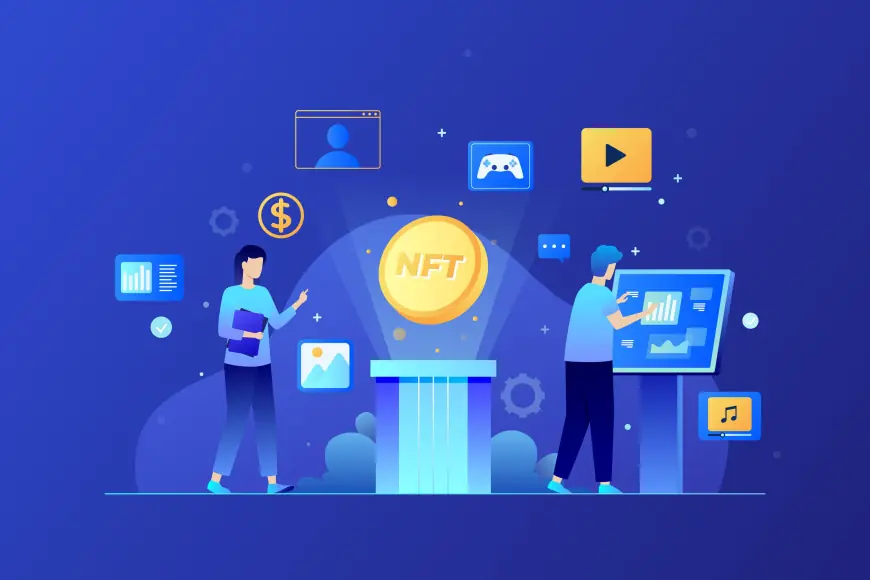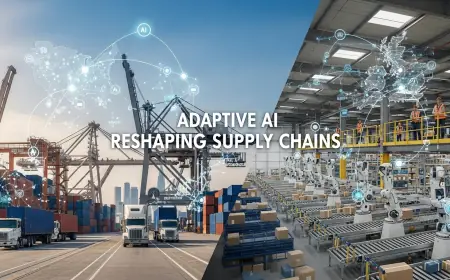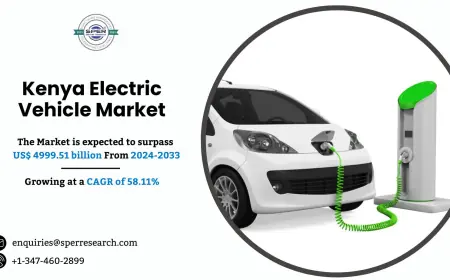Exploring Blockchain Frontiers: How It’s Transforming Industries Worldwide
Explore how Blockchain is transforming industries worldwide with real use cases. Learn about Blockchain development services and future opportunities.

Blockchain technology has evolved far beyond its initial use case of cryptocurrency. Today, it is reshaping industries in ways that were once unimaginable. Companies across sectors are actively investing in Blockchain development services to leverage its core capabilities – transparency, security, decentralisation, and immutability. This blog explores how Blockchain is redefining operations, enhancing trust, and optimising efficiency across industries worldwide.
Blockchain in Finance: Beyond Cryptocurrencies
The financial industry was the first to witness Blockchain’s transformative power through cryptocurrencies. However, its impact extends deeper into traditional finance. Banks and financial institutions are using Blockchain to simplify cross-border payments, which often take days due to intermediaries and compliance processes. Blockchain reduces this time to minutes by creating direct digital ledgers between sender and receiver with cryptographic validation.
Decentralised finance (DeFi) is another area gaining rapid adoption. It allows individuals to lend, borrow, or invest without traditional financial intermediaries, ensuring access for people previously excluded from banking systems. Smart contracts enable these processes with automatic enforcement of terms, eliminating delays and disputes.
Companies providing Blockchain development services are building platforms to tokenize assets, where bonds, shares, and even real estate can be digitally represented, traded efficiently, and tracked with complete ownership transparency. This reduces fraud risks and operational overheads while increasing liquidity in financial markets.
Supply Chain: Increasing Traceability and Trust
Supply chain management has always struggled with inefficiency, lack of transparency, and counterfeit risks. Blockchain addresses these issues by providing immutable records at each stage of a product’s journey. From raw material sourcing to manufacturing, distribution, and retail, every stakeholder can update and validate transactions on a single distributed ledger.
For example, in food supply chains, Blockchain can track produce from farms to supermarket shelves. If contamination occurs, it helps trace the origin instantly, avoiding broad recalls and protecting public health. Similarly, pharmaceutical supply chains use Blockchain to authenticate medicines, preventing counterfeit drugs from entering the market.
Many global manufacturers partner with the best Blockchain development company to integrate smart contracts into their supply chains. These contracts automatically release payments upon milestone completions or delivery confirmations, eliminating paperwork delays and human errors. The result is enhanced trust among suppliers, manufacturers, and distributors.
Healthcare: Securing Patient Data and Medical Records
Healthcare systems handle sensitive patient data that requires high levels of security and privacy. Traditional centralised data storage is vulnerable to breaches and unauthorised access. Blockchain, with its cryptographic encryption and decentralised structure, secures patient records while allowing authorised professionals real-time access when needed.
Moreover, Blockchain enables interoperability among hospitals, clinics, and diagnostic centres. Patients can maintain their longitudinal medical history in a secure Blockchain wallet accessible through private keys. It also enhances clinical trials by providing immutable records of research data, preventing result manipulation and ensuring authentic research outcomes.
Healthcare Blockchain development services also include supply chain solutions to authenticate the origin of surgical instruments, vaccines, and lab reagents. This improves compliance and regulatory approvals by maintaining transparent logs of sourcing and handling.
Real Estate: Enhancing Transaction Speed and Ownership Verification
The real estate sector involves complex paperwork, lengthy verification, and multiple intermediaries such as brokers, legal advisors, and registration authorities. Blockchain simplifies property transactions by digitising deeds, titles, and ownership records onto a decentralised ledger.
With Blockchain-based smart contracts, property sales can be executed instantly upon fulfilling agreed terms, eliminating manual approvals and payment delays. Title verification, a critical and time-consuming part of real estate transactions, becomes quicker and more reliable as Blockchain records are immutable and timestamped.
The best Blockchain development company solutions include fractional ownership platforms, enabling multiple investors to co-own properties by holding digital tokens representing their share. This opens up the real estate market to smaller investors while enhancing liquidity for developers and owners.
Energy Sector: Empowering Decentralised Energy Trading
Blockchain is facilitating decentralised energy markets by allowing households and businesses with renewable energy installations to trade excess energy directly with others on peer-to-peer platforms. Smart contracts manage these transactions automatically, ensuring fair pricing and instant settlements without involving traditional utility companies as sole intermediaries.
Additionally, Blockchain tracks carbon credits, renewable energy certificates, and emission data with transparent validation. This allows industries to prove regulatory compliance and meet sustainability goals more efficiently. Blockchain development services in the energy sector focus on building trading platforms, grid management solutions, and carbon footprint tracking applications that integrate seamlessly with existing energy systems.
Government and Public Services: Increasing Efficiency and Reducing Corruption
Governments worldwide are adopting Blockchain to streamline public services, reduce corruption, and enhance citizen trust. Land registry systems built on Blockchain reduce fraudulent transfers by maintaining an immutable record of ownership history. Voting systems secured by Blockchain ensure transparency and prevent tampering, boosting electoral integrity.
Welfare distribution is another area being transformed by Blockchain. Benefits and subsidies can be transferred directly to citizens through Blockchain-based digital identities and wallets, eliminating intermediaries who may misappropriate funds. This increases the speed and accuracy of distribution, ensuring that aid reaches intended beneficiaries.
Media and Entertainment: Protecting Intellectual Property Rights
The digital content industry faces challenges with copyright infringement and fair compensation for creators. Blockchain provides solutions by enabling creators to register their work on decentralised ledgers, proving ownership and licensing terms securely.
Smart contracts facilitate automatic royalty payments to artists, authors, and developers whenever their content is used, purchased, or streamed. This transparency increases creator income while ensuring distributors pay only for authentic and licensed content. Blockchain development services in media focus on building NFT marketplaces, copyright management systems, and royalty distribution platforms to empower creators worldwide.
Logistics and Transportation: Improving Fleet Management and Freight Tracking
Logistics companies are leveraging Blockchain for fleet tracking, shipment verification, and optimised route management. Traditional freight tracking involves multiple intermediaries and manual documentation, which increases transit time and costs. Blockchain provides real-time data on vehicle location, shipment status, and route efficiency, ensuring seamless coordination between drivers, warehouses, and customers.
Freight payments can also be automated through smart contracts, releasing funds upon successful delivery confirmation, thereby reducing disputes and improving cash flow for transport companies. As logistics remains a backbone of global trade, Blockchain continues to enhance efficiency and profitability in this sector.
The Future of Blockchain: Integration with Emerging Technologies
Blockchain’s future lies in its convergence with other technologies such as Artificial Intelligence (AI), Internet of Things (IoT), and 5G. In smart cities, IoT devices generate vast data, and Blockchain secures, authenticates, and stores this data with full traceability. AI models can analyse Blockchain-secured data to optimise city services, energy use, traffic, and security protocols.
In autonomous vehicles, Blockchain verifies software updates, driving logs, and maintenance records, ensuring safety and compliance without data tampering. Similarly, in manufacturing, Blockchain combines with IoT to provide predictive maintenance, inventory tracking, and quality assurance with real-time authentication.
Choosing the Right Blockchain Development Partner
As organisations adopt Blockchain at scale, choosing the best Blockchain development company becomes crucial. The right partner will understand regulatory frameworks, security protocols, and your specific business goals to design scalable Blockchain solutions that integrate with existing systems.
Blockchain is not a generic plug-and-play solution. Each use case requires a tailored approach, whether developing a DeFi platform, supply chain ledger, decentralised application, or NFT marketplace. Companies offering Blockchain development services combine expertise in smart contracts, consensus mechanisms, and cloud or on-premise deployments to deliver effective solutions.
Conclusion:
Blockchain has emerged as more than a technological trend. It is a structural shift in how data, transactions, and trust are managed in society. From finance to healthcare, supply chain to government services, and real estate to energy, Blockchain is optimising processes, enhancing transparency, and empowering people to own and control their data and assets securely.
As industries continue to explore Blockchain frontiers, collaboration with skilled Blockchain development services will determine how seamlessly and successfully this transformation unfolds. Companies and governments that embrace Blockchain with clarity and purpose will redefine efficiency, accountability, and inclusivity in the years to come.
What's Your Reaction?
 Like
0
Like
0
 Dislike
0
Dislike
0
 Love
0
Love
0
 Funny
0
Funny
0
 Angry
0
Angry
0
 Sad
0
Sad
0
 Wow
0
Wow
0

















































